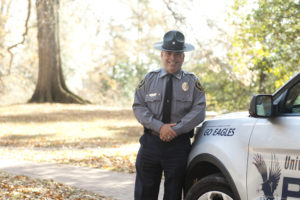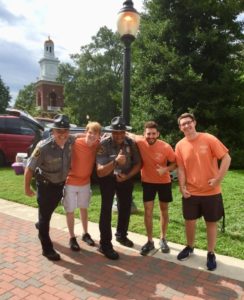Keeping a 5,000-person community safe can be overwhelming. But UMW Chief of Police Michael Hall does it all (well, almost all) with a smile. Don’t mention each semester’s rash of microwave fires.

UMW Chief of Police Mike Hall is committed to the UMW community, especially students. Photo by Karen Pearlman.
With a passion for service, both near and far – he spent 25 years in local and state law enforcement before coming to Mary Washington in 2009 – Hall leaves today for his annual mission trip to build pro bono structures in Africa.
Back home on Campus Walk, the chief stops to talk to any and all passersby, especially students. Fellow officers rush him along so he won’t spend all day socializing.
“I love interacting with people,” Hall said. “There is so much to learn from people.”
He loves anything that brings them to campus. At Orientation, he greets students at the front gate and asks them their names. He wants them to know that he cares. He wants to help them succeed.
Q: How does your job at UMW compare to your past work?
A: There’s much more community involvement and interaction. If I make an arrest today, I could see that individual for four more years. Our goal is to bridge the gap from the campus lifestyle to the outside world. We have conversations and discuss their mistakes. We give them the opportunity to go through judicial affairs and do community service to reflect on their choices, which can have a lasting impact.
Q: How does the stress on a college campus compare to other types of policing?
A: The stresses are higher. You’re under scrutiny and subject to the opinions of guests, faculty, staff and administrators. The volume of calls may not be as high, but the inherent danger in today’s society is high. Students are impressionable, and we want them to have a safe environment. These young people are our future. This is the next generation. We want to support that.

UMW Police Chief Mike Hall, left, and Officer M. Jackson with students on Move-In Day. This summer, the agency became only the fifth campus department to receive accreditation.
Q: UMW is one of only a handful of colleges to earn accreditation from the Virginia Law Enforcement Professional Standards Commission. What does this mean for campus police?
A: It makes law enforcement more transparent because we will be under evaluation, and that puts the public at ease. It also helps us stabilize recruits by providing salaries to retain them. For the past three years, no one has left the department. I attribute that to a more professional department, policies and procedures, fair salaries for what they do and interaction with the community.
Q: What’s the oddest thing someone has burned in one of those microwave fires?
A: Tennis shoes. They were trying to dry them off.
Q: What’s the funniest call you’ve ever gotten?
A: At Grad Ball, a student decided to leave the restroom and vacate the building with no clothes on. They had to come to the police department to pick up their pants before graduation rehearsal.
Q: What’s the deal with the blue lights around campus?
A: We’re addressing the lights and deciding where to redistribute them. They could serve as a deterrent. I don’t know if the blue lights have stopped anyone from doing something wrong or cautioned them to be more aware. It’s an unmeasurable system.
Q: What’s the most important thing students can do to ensure their own safety on campus?
A: Always be cognizant of your surroundings and take caution. Unfortunately, we live in a world where bad people do bad things to good people. I want to see our students successful and, more importantly, safe. I don’t want to see anyone become a statistic.
Q: What would people be surprised to learn about you?
A: The chief can cook. I love to cook with my 10-year-old daughter Madison. We have a pressure cooker we saw on TV, and we make ribs, wings, pineapple upside down cake, butterscotch pies.
Q: Any mottos you live by?
A: Always give back, enjoy life and know you’re never too old to dream.